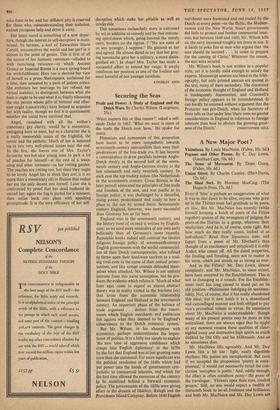Securing the Seas
'WHAT matters this or that reason?' asked a self- made Duke in 1662. 'What we want is more of the trade the Dutch now have.' He spoke for many.
Historians and economists of this generation have learnt to be more sympathetic towards seventeenth-century mercantilists than were their predecessors of the free-trade era. It has become a commonplace to draw parallels between Anglo- Dutch rivalry in the second half of the seven- teenth century and Anglo-German rivalry in the late nineteenth and early twentieth century. In each case the top trading nation (the Netherlands in the seventeenth century, Great Britain in the later period) advocated the principles of free trade and freedom of the seas, and was pacific in its foreign policy; it was challenged by a thrustful, rising power, protectionist and ready to hew a place in the sun by armed force. Seventeenth- century England, however, was more successful than Germany has so far been.
England won in the seventeenth century, and the history most of us read is written by English- men; so we need more reminders of our own early bellicosity than of Germany's more recently. Reputable books indeed still contrast the idealist religious foreign policy of seventeenth-century English governments with the sordid commercial- ism of their Dutch contemporaries, who refused to throw open their hard-won markets to a trad- ing rival even in the name of their mutual protes- tantism, and like savage animals defended them- selves when attacked. Mr. Wilson is not entirely immune from this naive conception, but he pro- duces the evidence which refutes it. 'Much of what later ages came to regard as almost abstract theory was in reality rooted in the frictions (sic) that arose from the economic relationship between England and Holland in the seventeenth century. An important phase of the balance of trade argument . . . derives from the resent- ments which English merchants and politicians felt against what they deemed to be England's subservience to the Dutch economic system.' . But Mr. Wilson, in his absorption with economics, perhaps underestimates the impor- tance of politics. It is a little too simple to explain 'the new tone of aggressive confidence which creeps into English diplomacy' in the 1650s by the fact that England was at last growing more corn than she consumed. Far more significant was the political revolution of the 1640s which had put power into the hands of governments sym- pathetic to commercial interests, and which for the first time allowed the resources of the country tp be mobilised behind a forward economic policy. The governments of the 1650s were giving effect to the dreams of Hakluyt, Ralegh and the Providence Island Company. Before 1640 English merchants were frustrated and out-traded by the Dutch at every point—in the Baltic, the Mediter- ranean and the New World. Stuart governments did little to protect and further commercial inter- ests; but between 1640 and 1660, Mr. Wilson tells us, the navy increased roughly ten times in size. It is facile to poke fun at men who argued that 'the seas should be secured . . . in order to prepare for the coming of Christ.' Whatever the reason, the seas were secured.
Mr. Wilson's book is not written in a popular style, yet it is hardly solid enough to satisfy the experts. Manuscript sources are listed in the bibli- ography, but only printed sources are quoted in the text, many of them secondary. The discussion of the economic thought of England and Holland is inadequately documented, and Cromwell's foreign policy appears to be misunderstood. It can hardly be assumed without argument that the Protector was pro-Dutch, when his Secretary of State tells us that under him 'there were no greater considerations in England in reference to foreign interests than how to obviate the growing great-


































 Previous page
Previous page